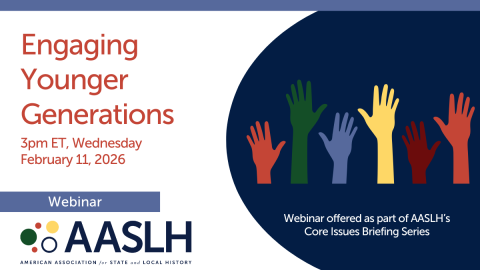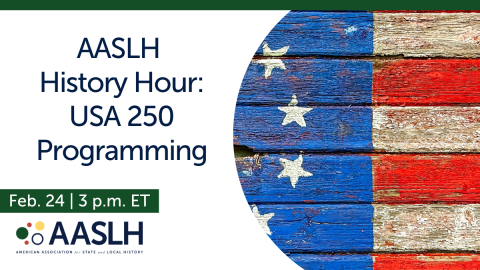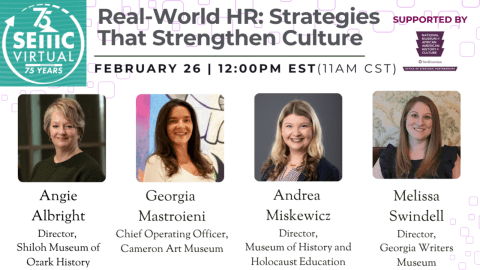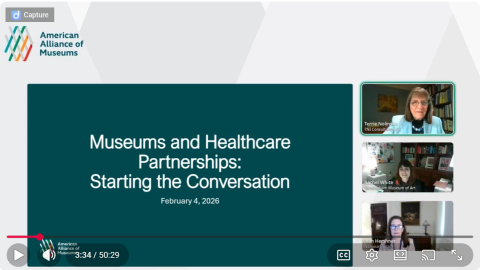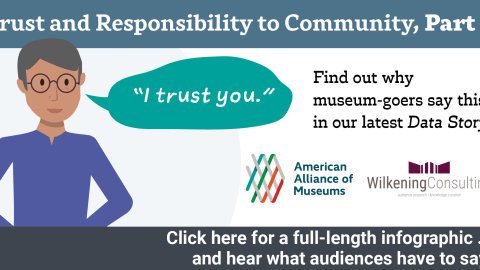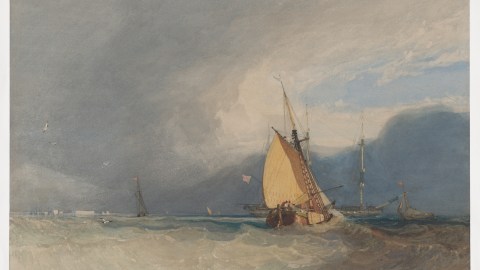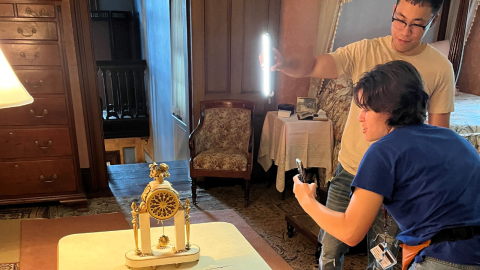
This article originally appeared in Museum magazine’s September/October 2023 issue, a benefit of AAM membership.
The US Semiquincentennial is an opportunity for museums and cultural institutions to bring people together in the quest for liberty, equality, and justice.
Fifty years ago, a museum on wheels made America’s Bicentennial tangible to my classmates and me. Tall ships and snippets of history on TV were exciting, Bicentennial quarters and stamps were everywhere, and mass commercialization of the Spirit of ’76 made the commemoration inescapable.
But it was the American Freedom Train rolling through Albuquerque in February 1976, with its railroad cars showcasing artifacts and documents, that made the celebration resonate with us.
In less than three years—July 4, 2026—the US will mark the Semiquincentennial. Museums and cultural institutions can use the excitement and attention inherent in this once-in-a-generation event to engage visitors and build stronger institutions. We have two key opportunities here. First, the nation’s 250th anniversary is a chance to help American society progress toward justice through an inclusive approach to history. It is also an opportunity to strengthen our museums and related cultural organizations by attracting new interest and investment.

By offering a chance to learn about and reflect on the full sweep of our nation’s past, the Semiquincentennial commemoration can ensure people of all backgrounds see themselves in American history. A fuller grasp of past events also helps young and old alike understand how their democracy should work. For our 250th we can explore how different groups have been included in “We the People,” how the American experiment in constitutional democracy continues, and how the revolution for liberty, equality, and justice—the fight—is ongoing.
Planning So Far
Several years ago, Congress created the U.S. Semiquincentennial Commission and its nonprofit administrative arm, the America 250 Foundation, to lead the planning for the anniversary. According to the commission’s first report in 2019, it would be “engaging all Americans in what is expected to be the largest and most inclusive celebration and commemoration in our nation’s history.”
Unfortunately, the path has been rocky. Internal friction within the commission has hindered its progress. Today, the commission and foundation are chaired by former U.S. Treasurer Rosie Rios, who has restructured both organizations to more clearly define their roles. Commission staff focus on relationship management with the federal government and strategic partners. Foundation staff focus on procurement, fundraising, program planning, and marketing. In July 2023, Rios announced new plans around the theme “America’s Invitation.”
Still, the commission’s and foundation’s structural and programmatic reset was built on years of useful work. Since 2019, the America 250 Foundation staff has conducted numerous surveys and listening sessions around the country, including AAM Edcom, sought to engage tribal communities and US territories, established corporate and federal agency relationships, and begun to identify national signature programs, such as the “Young People’s Continental Congress” that is slated for Carpenters’ Hall in Philadelphia in 2024. For five summer days, high school students from all over the country will gather “to discuss contemporary issues of democracy and civic engagement and make recommendations for how to address them.”
For the Semiquincentennial as a whole, what comes next will depend on America’s receptiveness to America 250’s message. That’s because the commission and America 250 Foundation—as well as the American Association for State and Local History (AASLH), the national association for history institutions and the staff and volunteers that make them run—foresee a decentralized commemoration with most of the action at the grassroots level.
Like the American Freedom Train in 1976, museums, historic sites, and other cultural organizations in tens of thousands of communities across the nation will connect people to the 250th. People of all ages and backgrounds, in every state and territory, should see themselves and their communities in this shared history and cultural occasion, experiencing it locally. This path to 2026 can help us show audiences not just that history matters, but that their history matters.
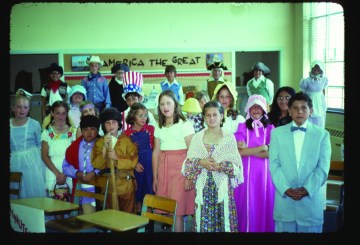
Thirty-three states now have a state 250th commission or similar lead planning group to shape, promote, and coordinate activities, with related legislative action pending in a handful of additional states. These planning bodies are at various stages of organization and have wildly different levels of funding. In general, the dollars aren’t there, which is even more reason to count on the Semiquincentennial being a grassroots commemoration. If your state does not have a 250th commission, now is the time to approach your state representatives or governor’s office. If your state is set, then reach out to the commission to help and perhaps coordinate starting a city- or county-level commission.
At the federal level, a dozen major federal agency heads serve on the Semiquincentennial Commission, and in 2021, 21 agencies signed an interagency memorandum of understanding that commits them to planning, creating, and collaborating on 250th anniversary programming. While many agencies have not yet made their plans public, some early signs of their involvement have emerged.
- The Institute of Museum and Library Services (IMLS) recently announced a partnership with PBS Books to produce “Visions of America: All Stories, All People, All Places.” This series of virtual conversations and videos will “explore … our post-pandemic nation with a renewed interest in the places, people, and stories that have contributed to the America we live in today.”
- Expanding on its “A More Perfect Union” initiative, which focused on projects that enhance our understanding of the country’s founding period, the National Endowment for the Humanities (NEH) has launched a much broader agency-wide program. NEH’s “American Tapestry: Weaving Together Past, Present, and Future,” which incorporates the earlier initiative, will “use the humanities to strengthen democracy, advance equity for all, and address our changing climate.”
- For 2024, the National Park Service (NPS) has dedicated funds for “diverse programming that promotes shared stories and experiences and strengthens common bonds … leading up to July 4, 2026.” NPS also offers preservation-based support through its Semiquincentennial Grant Program.
What Museums Can Do
At AASLH, we believe the Semiquincentennial presents a valuable opportunity to advance justice in US society through an inclusive approach to history. To do this, we will need to promote a complete story of our past—one that encourages critical thinking and asks us to consider how lessons of the past can help us continue to pursue liberty and justice for all.
We should also seize this moment to think about the long-term health of the field. The 250th offers a rare opportunity to invest in the institutions and people that make up the nation’s historical infrastructure, ensuring our stories, objects, documents, buildings, and landscapes are preserved and shared for generations to come. The Semiquincentennial is a chance to prioritize history and civics funding for museums, libraries, and education in a way that can have an impact long after the celebration ends.
Undergirding this vision, AASLH has been circulating five historical themes for the 250th: “Unfinished Revolutions,” “Power of Place,” “We the People,” “American Experiment,” and “Doing History.” These are guiding ideas that we think will open up multiple avenues of questions and introspection. Released in 2021, our Making History at 250: The Field Guide for the Semiquincentennial explores these themes and readies them for different contexts. We have distributed more than 20,000 print copies and have received a second NEH grant for another printing. (You can download a copy at aaslh.org/Making+History+at+250+Field+Guide.pdf.)
Several states have begun to borrow and expand on these five themes. Taken individually and in combination, these approaches foster an honest, inclusive, and comprehensive understanding of the past. With many institutions using and amplifying these themes, we can enhance each other’s programming and reinforce the public’s engagement in the 250th.
Why This Anniversary Matters
With the country as ideologically divided as it is today, museums, historic sites, and other cultural organizations can use the Semiquincentennial to help bring people together: across racial and ethnic divides, across cultural divides, and across political divides. Doing so will contribute to the mending of our civic fabric, the restoration of and respect for evidence and good-faith-based arguments, and the revitalization of interest in and support for third-space organizations, making them increasingly integral to people’s lives and communities.
At the end of last year, a survey group, More in Common, released a fascinating and heartening report, Defusing the History Wars: Finding Common Ground in Teaching America’s National Story. It studied polarization in the national conversation over how US history should be taught to future generations. This report confirms findings in AASLH’s Reframing History research and in national surveys done by the American Historical Association and the American Academy of Arts & Sciences, which show there is great national support, across political lines, for inclusive history and humanities.
According to More in Common’s report, 86 percent of Americans—the vast majority of both Republicans and Democrats—agree on fundamental ideas about our national history and how it should be taught. “Americans of all political orientations want their children to learn a history that celebrates our strengths and also examines our failures. Americans overwhelmingly agree that the experiences of minority groups are an important part of that history. And they agree that if students are better informed about America’s past there’s a better chance of not repeating past failures.” That is a vision of inclusion and belonging.
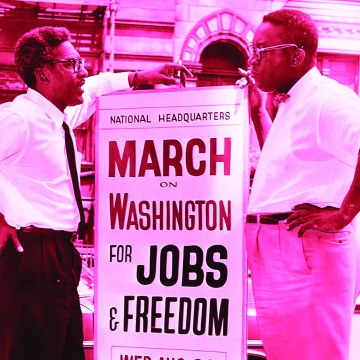
Despite many shortcomings, the Bicentennial 50 years ago had a tremendous impact. Thousands of us working in museums, education, and related fields today were inspired—or provoked to do better—because of what we experienced during the Bicentennial. State humanities councils were established in that era, and the museum side of what became IMLS was launched in 1976. There was a huge flood of general public interest in the American story, local history and culture, and genealogy and historic preservation. The tide turned for broadening attention to diverse histories, too, spawning deeper, grassroots appreciation for local history and the creation of thousands of local history projects, organizations, and museums. The “public history movement” itself was a creation of the Bicentennial era. What kind of legacy can we cast for this Semiquincentennial?
With 2026 less than three years away, let’s seize this moment to ensure that this anniversary exceeds our aspirations. Each day we delay diminishes the likelihood that we will reach the full potential of this commemoration. Despite the ongoing 250th activities happening around the country, there is much more we can do.
What You Can Do
- Review the fascinating research from Made By Us about engaging Gen Z in the 250th at
bit.ly/MadeByUS-GenZ. - Create a lead 250th commission or committee in your state or connect to an existing one: aaslh.org/programs/250th/.
- Start a 250th commission or committee in your local community. Download the free AASLH Technical Leaflet to learn more: aaslh.org/AASLH_Technical_Leaflet_300.pdf.
- Urge your members of Congress to join the Congressional America250 Caucus to support the 250th anniversary. Learn more at aaslh.org/america250-caucus.
- Map your 250th programming onto the US Department of Education and NEH’s “Educating for American Democracy” inquiry-based education framework for building civic knowledge and action at educatingforamericandemocracy.org.
- Learn more about “America’s Invitation” at america250.org.
- Download the Reframing History toolkit to understand how Americans think about history and how our field can more effectively explain history’s value: aaslh.org/reframing-history.
- Use one or more of the five 250th themes in AASLH’s Field Guide: aaslh.org/programs/250th.

